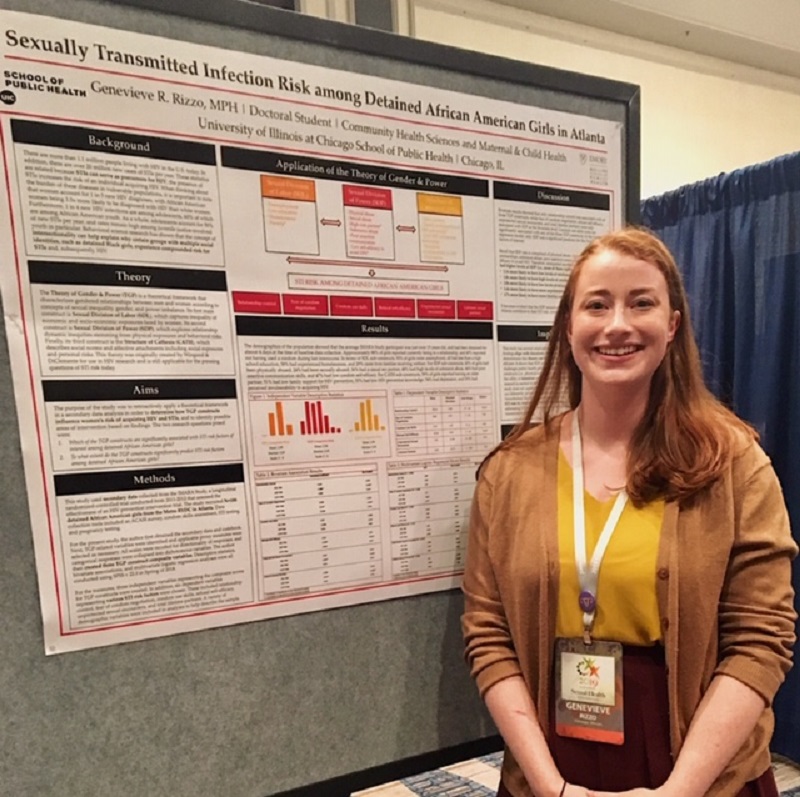Monthly Archives: August, 2019
UIC MCH TRAINEE AT THE 2019 NATIONAL SEXUAL HEALTH CONFERENCE Heading link

Posted: August 15th, 2019
Author: Genevieve R. Rizzo, MPH | Doctoral Student | Community Health Sciences, Maternal and Child Health
This summer, I had the opportunity to attend and present at the 2019 National Sexual Health Conference (NSHC) in downtown Chicago, thanks to a travel grant from the UIC Center of Excellence in Maternal and Child Health (CoE-MCH)! The three-day conference brought together clinicians, researchers, educators, social workers, and healthcare administrators from across the country, all of whom share a passion for sexual and reproductive health. The main mission of the NSHC was “to move sexual health forward in the United States by creating opportunities to share information, efforts, and best practices around sexual health across the lifespan, as well as by bridging the varied disciplines of education, advocacy, and clinical care.” This year, there were approximately 1,000 participants and presenters coming together with this shared goal. The conference format was organized in a way that attendees could pick and choose which panels, presentations, and workshops they wanted to go to during various designated time slots during each of the three days. With over 100 different sessions to choose from, content spanned the spectrum of sexual health topics, including reproductive health, comprehensive sex education, abortion policy, HIV/AIDS and PrEP developments, gender identity and LGBTQ health concerns, sexual violence prevention, stigma, and health equity.
Because my personal research interests lie in reproductive health and adverse childhood experiences (ACEs), I sought out sessions that would give me new perspectives and knowledge on topics I am already so passionate about. For example, I was able to attend workshop sessions such as “Integrating Trauma-Informed Approaches into Sexual Health Education” and “How to Collect a Patient’s Sexual History Information with Compassion, Sensitivity, and Efficiency.” I also wanted to get out of my research area “comfort zone” and attend sessions on topics I previously did not know that much about, in order to learn as much as I could and take advantage of all of the expertise and resources the conference had to offer. One of my favorite presentations at the conference was a presentation called “Sexual Development of Black Girls: A Grounded Theory Study,” which shared some fascinating findings about how Black girls described their journeys of becoming sexual Black women and presented a unique qualitative methodology as well.
In addition to the variety of workshops and sessions, the conference also included a poster and networking reception night. Earlier this year, the abstract I submitted was accepted for presentation at the conference, so I had the opportunity to share a poster about my master’s thesis research, entitled “Sexually Transmitted Infection Risk among Detained African American Girls in Atlanta.” The reception was a fun environment to present in, where people strolled by and stopped to ask questions about my research. This was my first time presenting independent research at a conference, so it was a very exciting and nerve-wracking experience!
Overall, I had a wonderful time presenting at the conference and gained so much knowledge and skills from all of the sessions I attended over the three-day period. I truly appreciate how invested the CoE-MCH is in its students’ professional development; as a doctoral student, these kinds of conference experiences are invaluable in helping shape us into confident, capable researchers. I am so grateful for the travel grant the CoE-MCH awarded me so that I could attend, and for the chance to connect with fellow researchers passionate about sexual health.